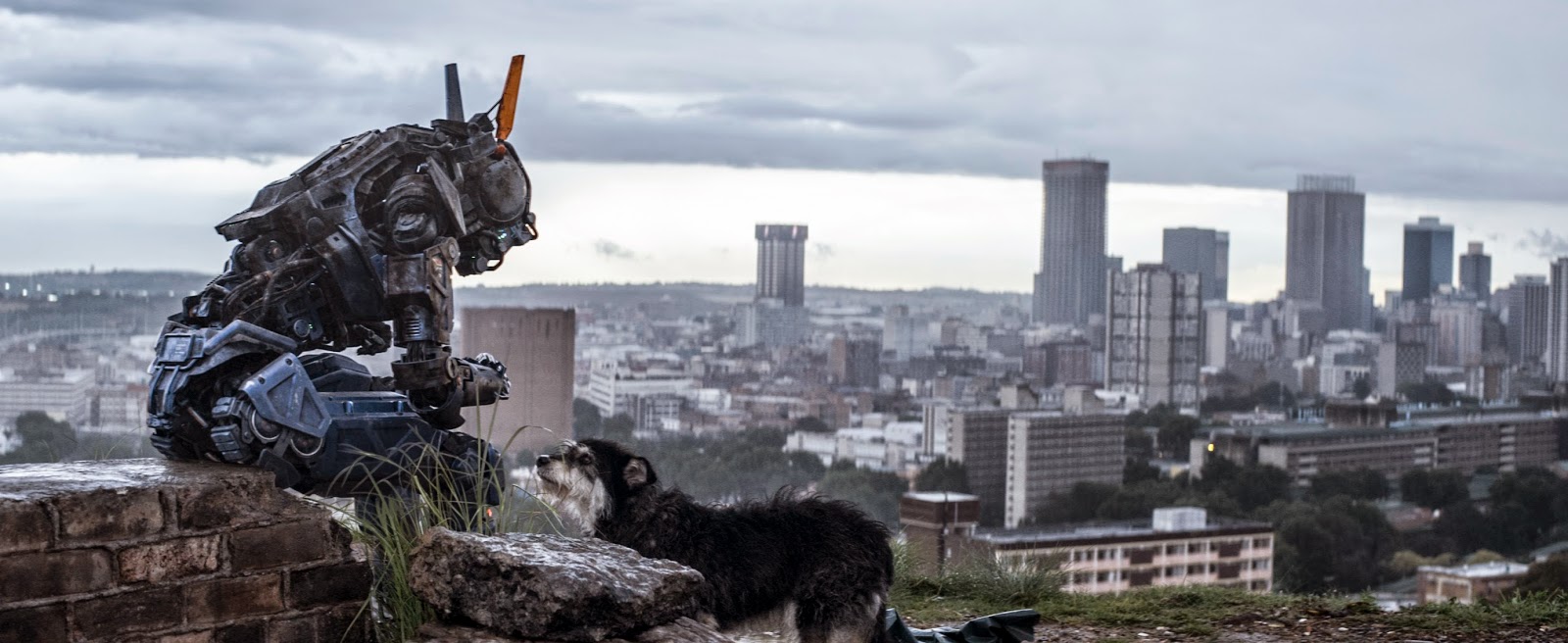Chappie has been very anticipated for a long time. After Blomkamp had a slight misfire with Elysium, fanboys and film lovers have been quietly hoping for a return to form, after the stunning and admired debut District 9 a few years ago. It seems we may have to wait a little longer.
Chappie is a very cool movie. It’s got Blomkamp’s trademark uber-realistic surroundings in an alternative future vision – worn weaponry; creative technics; edgy dress; dilapidated backdrop – and comes complete with larger-than-life characters (or should that be caricatures?) and some killer lines amidst the bloody violence. I mean, it’s got a robot who bumps fists, walks like a gangster and uses street rhetoric: it doesn't get much cooler than that, does it?
I’m not really sure what is going on with Blomkamp. His debut is one of the strongest, and most prolifically adored first-films ever, and is so startlingly well-realised, that it’s a wonder how he seems to have missed the mark on his second and third outings.
Elysium, another slick film, had neither the depth nor gravity of its predecessor and was a misfire on most accounts, and although
Chappie had a stronger premise than
Elysium, its final delivery was not much better, and certainly not a return to initial form.
Set in a South Africa, which (again) sees the streets overrun with crime and anarchy, the government has dispatched effective and ruthless police robots to curve the crime levels and restore peace from a shady engineering organisation (of course!). When the boffin inventor of these droids (Dev Patel) decides to experiment with his breakthrough A.I. software on a decommissioned robot, he is kidnapped by a trio of moronic villains and coerced into giving them his new creation, the titular Chappie. His rebirth meaning he is still an adolescent, he is a bewildered and curious 'bot', soon exploited for carjackings, petty crime and the inevitable big heist which the film is working towards. It’s predictable and shallow, whilst trying so hard to be poignant and moving.
The special effects and cinematography are superb – Blomkamp’s production values are always top-notch, but there are gaping holes in the plot (why would the inventor return in full view to a bunch of feckless criminals the day after escaping imminent death?) and very little intelligence to ponder on or question.
Chappie is a popcorn flick, like
Elysium, which is fine if it weren't such a letdown by the guy who brought us Wikus Van De Merwe, alien prawns, huge allegorical scope, depth of performance, and a plethora of breath-taking action scenes six years ago.
Although
Chappie is disappointing, it's still enjoyable to watch – fun, stupid, thrilling and action-packed – but the main letdown here is Blomkamp’s decision to cast Die Antwoord, and although the supporting cast are superior actors, there seems to be an abundance of miscasting. Yolandi and Ninja have almost nil talent between them as actors. They are neither convincing nor funny, and there is no empathy, likability or shared interest for us to invest in, instead their presence just seems to jar the entire film. Hugh Jackman is absolutely wasted here, a generic bully-like weapons designer so hellbent on using his own behemoth weapons-creation he’ll tread on anyone and anything to do so, and similarly, Sigourney Weaver as the organisation's shady boss is devastatingly underused - she has very little to say or do throughout. It’s these kind of one-dimensional characters which are such an anticlimax, and sadly, their are very few (if any) memorable scenes or strong delivery from the core cast. Chappie is the real star of the show, and deserved a better film to showcase his talents. Sharlto Copley delivers a great pitch and nuance to his voice – for the third time running the best casting decision in the film.
Chappie was sadly eclipsed by
Ex Machina in the A.I. movie stakes, and serves a completely different demographic – here, popcorn audiences being the mass market I’m guessing. It’s a shame, because it had the makings of a great film, but too many factors dragged it down. I’m starting to question the decision to put Blomkamp in charge of the
Alien franchise – he better not continue on this downward path, as his audiences won’t be so forgiving next time. [3/5]





















